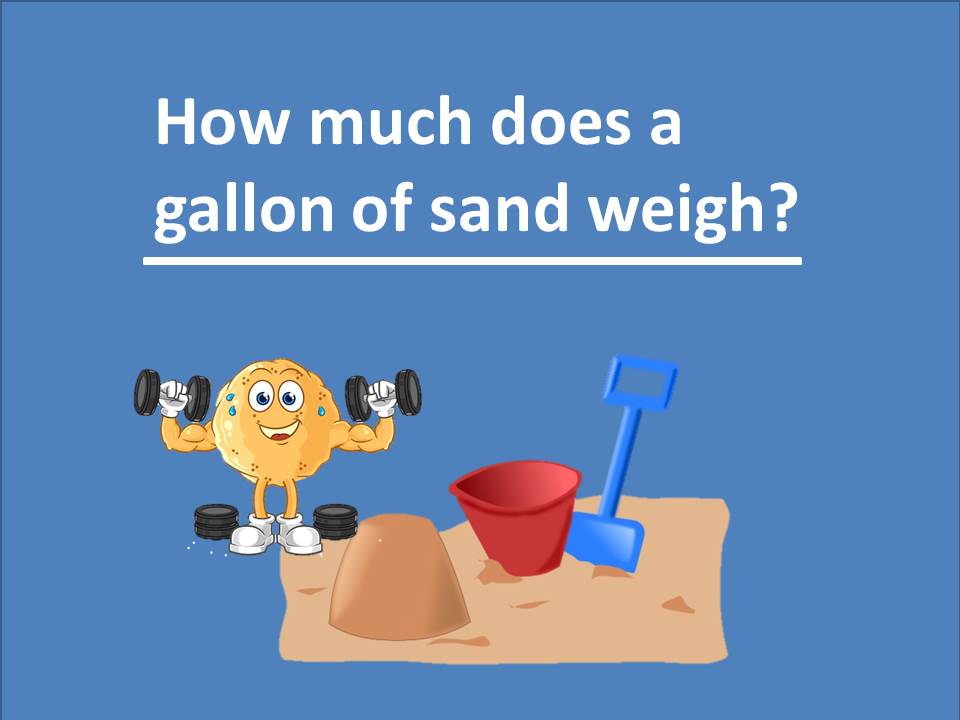Whether you’re doing some landscaping job or are planning for your delivery of materials; know how much does a gallon of sand weigh is a common question. Homeowners are often wondering how heavy is a bucket of sand or how heavy is a gallon of sand?
Sand is a building material which is used for construction purpose in concrete. The accurate calculation of materials is very important for quality assurance of concrete. The sand is available in different forms. The weight of sand depends upon some factors given below
- Moisture content
- Size of sand particle
- Shape of particle
- Grading of sand
Sand can be loose, normal compact, fully dense. Similarly, it can be a coarse sand, fine sand or graded sand. The moisture content also affects the volume and weight of sand.
Here in this article, we will learn how much does a gallon of sand weight in different countries.
The weight mainly depends upon the density of sand and density is affected by the factors given above. The density is calculated by simple formula
Density= Mass/Volume
If we know the density of sand of particular area, then we can calculate the weight of sand for any number of volumes.
Density of sand for different conditions is given below in table
| Condition of sand | Density of sand (Kg/liter) |
| Dry loose sand | 1.442 |
| Dry sand | 1.60 |
| Wet sand | 1.92 |
| Wet Packed sand | 2.08 |
| Beach Dry sand | 1.53 |
For estimating purposes in construction sector, the average weight of sand is taken as 1600kg/m^3 or 1.6kg/liter.
Also Read: 11 Different Types of Sand and their uses in Construction

How much does 1 gallon of Sand weigh?
The volume of 1 US gallon is equal to 3.78 liters. The volume of sand for 1 gallon will be taken in liters which is equal to 3.78liters. The weight of 1 gallon sand can be calculated by multiplying its density by volume of sand.
- Volume of a sand =1 gallon
- 1 gallon = 3.78 liters
- Volume of sand = 3.78×1 liters
- Volume of sand in liters =3.78 liters
For natural dry sand
- Average value of density of dry sand =1.60kg/liter
- Weight of sand =Density× Volume
- Weight of 1 gallon sand =1.60kg/liter ×3.78liters
- Weight of 1 gallon sand =6.05 kg
For Loose dry sand
- Average value of density of loose sand =1.442kg/liter
- Weight of sand =Density× Volume
- Weight of 1 gallon sand =1.442kg/liter ×3.78liters
- Weight of 1 gallon sand =5.45 kg
Also Read: How much does a yard of sand weigh?
For Wet sand
- Average value of density of wet sand =1.92kg/liter
- Weight of sand =Density× Volume
- Weight of 1 gallon sand =1.92kg/liter ×3.78liters
- Weight of 1 gallon sand =7.3 kg
Also Read: Rapid Sand Filters – Working – Components
How much does 2 gallon of Sand weigh?
The volume of a sand is given in gallons. As we know that one US gallon equals to 3.78 liters. First, we will convert the volume of sand from gallons to liters which becomes 7.56 liters. Then weight of 2 gallon sand is calculated by multiplying the density (kg/liter) with volume of sand.
- Volume of a sand =2 gallon
- 1 gallon = 3.78 liters
- Volume of sand = 3.78×2 liters
- Volume of sand =7.56 liters
For natural dry sand
- Average value of density of dry sand =1.60kg/liter
- Weight of sand =density× Volume
- Weight of 2 gallon sand =1.60kg/liter ×7.56liters
- Weight of 2 gallon sand =12.10 kg
For Loose dry sand
For Wet sand
How much does 3 gallon of Sand weigh?
The density of sand is given in kg/liter. So, first step is to convert the volume from gallon to liters. The volume of 1 US gallon is equal to 3.78 liters. The volume of sand for 3 gallon will be equal to 11.34 liters. The weight of 3 gallon sand can be calculated by multiplying the density of sand by volume of sand.
- Volume of a sand =3 gallon
- 1 gallon = 3.78 liters
- Volume of sand = 3.78×3 liters
- Volume of sand in liters =11.34 liters
For natural dry sand
- Average value of density of dry sand =1.60kg/liter
- Weight of sand =density× Volume
- Weight of 3 gallon sand =1.60kg/liter ×11.34liters
- Weight of 3 gallon sand =18.14 kg
For Loose dry sand
For Wet sand
How much does gallon of Sand weigh?
The density of sand is given in kg/liters So first we will convert the volume of 4 gallons into liters. The volume of 4 gallon sand is equal to 15.12 liters. The weight of a sand is calculated by multiplying the dry density (kg/liter) with volume of sand.
- Volume of a sand =4 gallon
- 1 gallon = 3.78 liters
- Volume of sand = 3.78×4 liters
- Volume of sand in liters =15.12 liters
For natural dry sand
- Average value of density of dry sand =1.60kg/liter
- Weight of sand =density× Volume
- Weight of 4 gallon sand =1.60kg/liter ×15.12liters
- Weight of 4 gallon sand =24.19 kg
For Loose dry sand
- Average value of density of loose sand =1.442kg/liter
- Weight of sand =Density× Volume
- Weight of 4 gallon sand =1.442kg/liter ×15.12liters
- Weight of 4 gallon sand =21.80 kg
For Wet sand
- Average value of density of wet sand =1.92kg/liter
- Weight of sand =Density× Volume
- Weight of 4 gallon sand =1.92kg/liter ×15.12liters
- Weight of 4 gallon sand =29.03 kg
How much does 5 gallon of Sand weigh?
In order to calculate the weight of sand first we will convert the volume from gallon into liters. As we know that 1 US gallons is equal to 3.78 liters. So, the volume of 5 gallons will be equal to 18.90 liters. Then we can easily calculate the weight of sand by multiplying the volume of sand by its density.
- Volume of a sand =5 gallon
- 1 gallon = 3.78 liters
- Volume of sand = 3.78×5 liters
- Volume of sand in liters =18.90 liters
For natural dry sand
- Average value of density of dry sand =1.60kg/liter
- Weight of sand =density× Volume
- Weight of 5 gallon sand =1.60kg/liter ×18.90liters
- Weight of 5 gallon sand =30.24 kg
For Loose dry sand
- Average value of density of loose sand =1.442kg/liter
- Weight of sand =Density× Volume
- Weight of 5 gallon sand =1.442kg/liter ×18.90liters
- Weight of 5 gallon sand =27.25 kg
For Wet sand
- Average value of density of wet sand =1.92kg/liter
- Weight of sand =Density× Volume
- Weight of 5 gallon sand =1.92kg/liter ×18.90liters
- Weight of 5 gallon sand =36.28 kg
Conclusion
The weight of sand depends upon its density. The density of sand is different in different regions depending upon its condition of size, grading, moisture and compactness. The weight of sand will be different in different conditions due to variation in density. It can be easily calculated by multiplying the volume with density of sand.
















